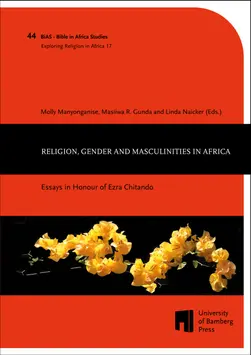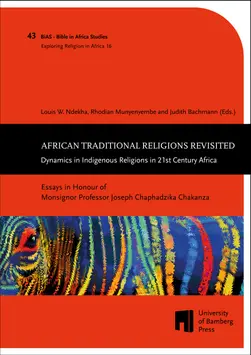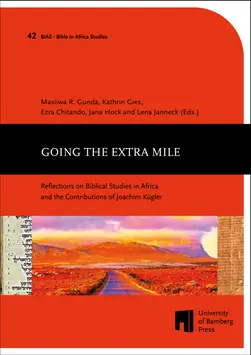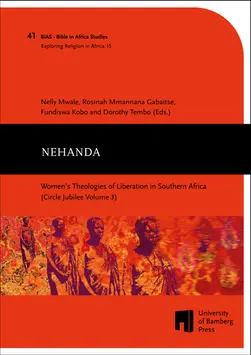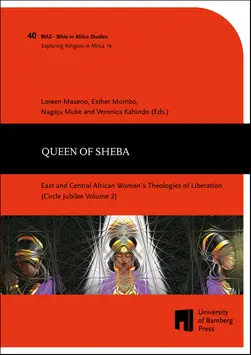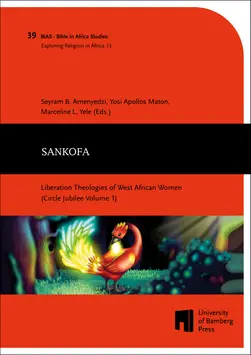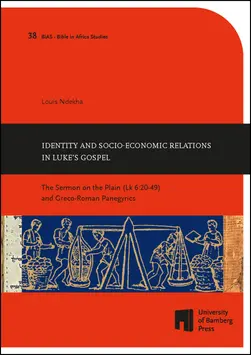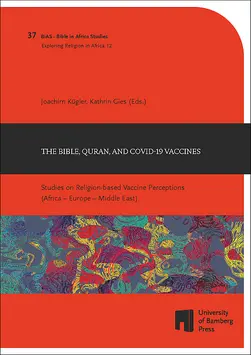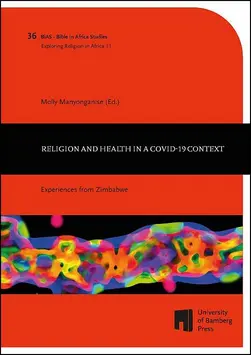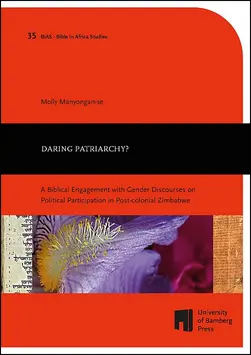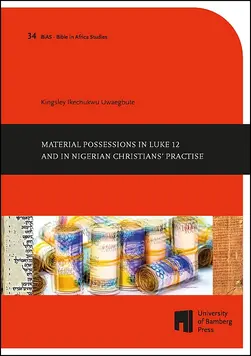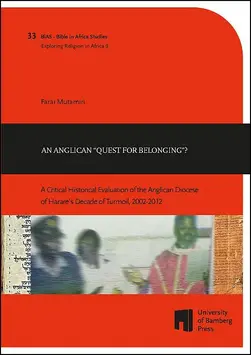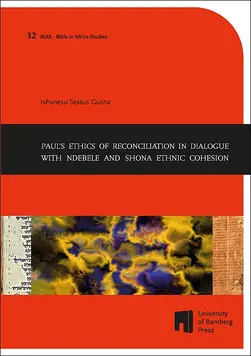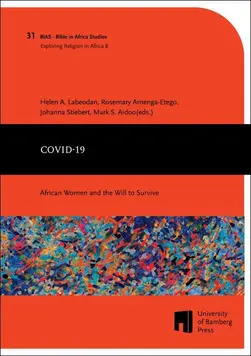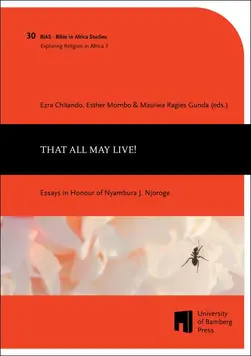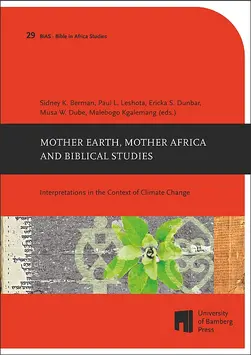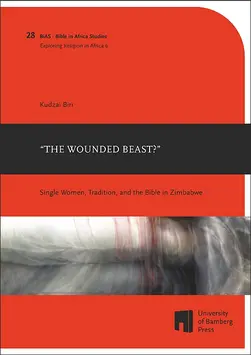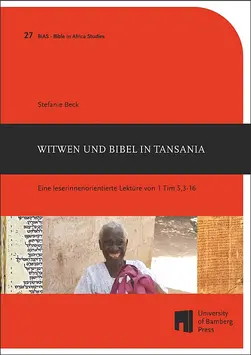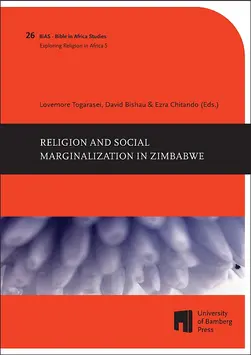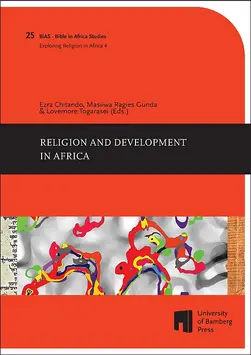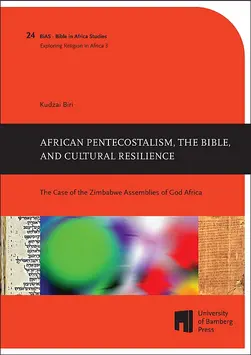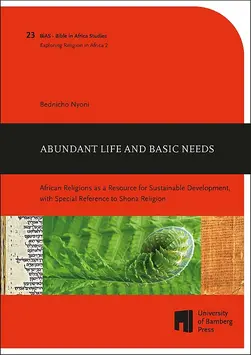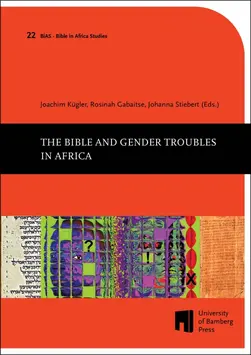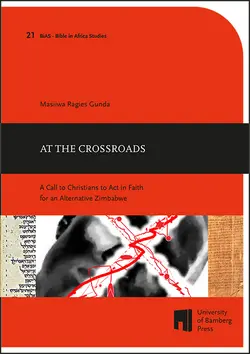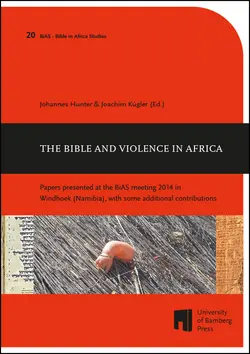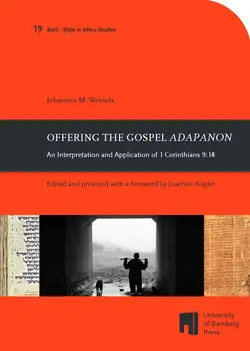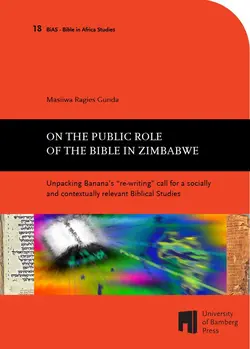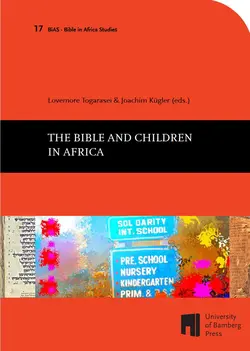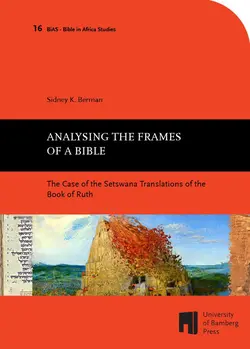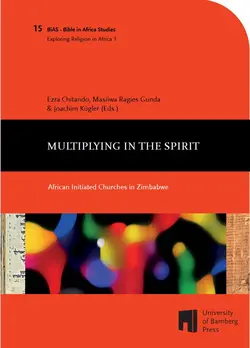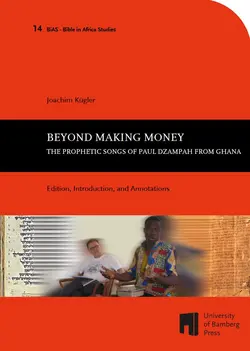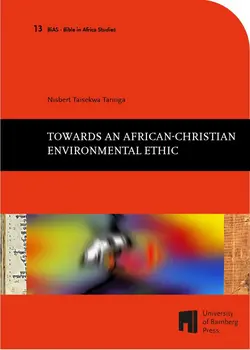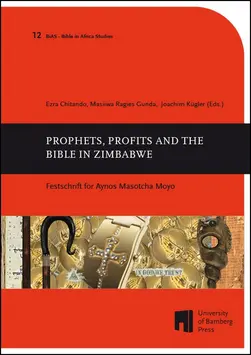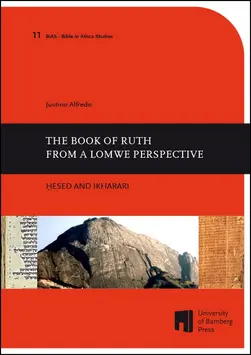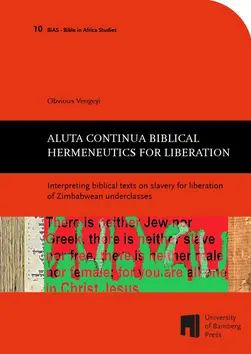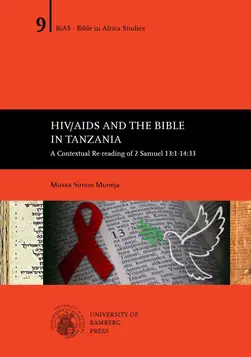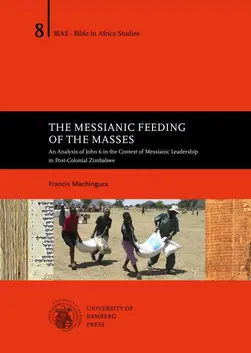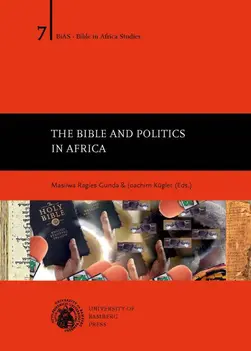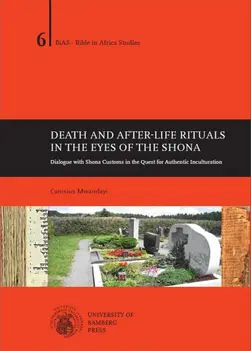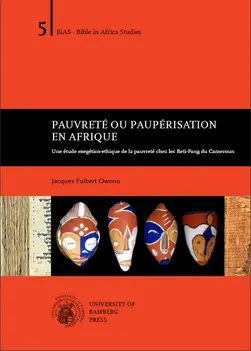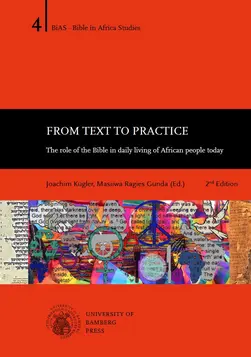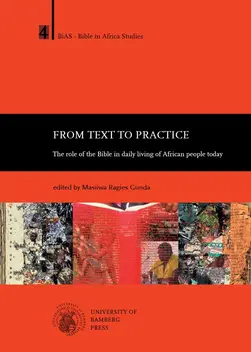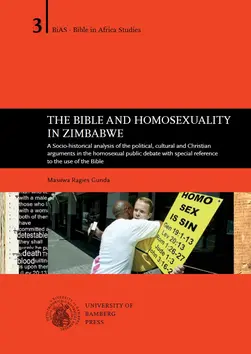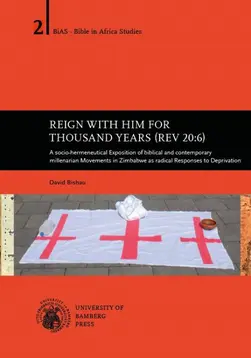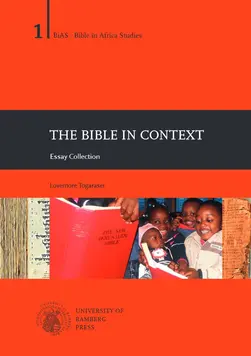Bible in Africa Studies
Established in 2009 by Joachim Kügler, Lovemore Togarasei and Masiiwa R. Gunda, this series (BiAS) of essays collections and monographs on Bible in Africa and Africa related Biblical Studies offers a forum of academic exchange on an international level. Scholars dealing with topics related to Africa and the Bible are invited to bring their best studies into the BiAS series. Studies transcending the area of biblical studies find a forum in the sub-series ERA (Exploring Religions in Africa). Online publication is without any costs; only printed exemplars need to be funded. BiAS is promoting academic accuracy, the option for the poor, gender fairness, diversity and environmental responsibility.
Edited by: Kathrin Gies, Joachim Kügler, Uta Poplutz, Kudzai Biri, Ezra Chitando, Rosinah Gabaitse, Masiiwa Gunda, Johanna Stiebert, Lovemore Togarasei.
ISSN: 2190-4944, eISSN: 2750-0179
Schriftenreihe im Forschungsinformationssystem (FIS) der Universität
Bisher erschienene Bände
Religion, Gender and Masculinities in Africa : Essays in Honour of Ezra Chitando / herausgegeben von Molly Manyonganise, Masiiwa R. Ragies und Linda Naicker; in Kooperation mit Joachim Kügler
Bamberg: Univ. of Bamberg Press, 2025
(Bible in Africa Studies ; 44) (Exploring Religion in Africa ; 17)
978-3-98989-042-8
Preis: 34,00 €
Since many years, Professor Ezra Chitando is an excellent scholar and dedicated activist, whose personal experiences, cultural and religious influences, and commitment to justice and partnership, shape his work on religion, gender, and African masculinities. Chitando has made meaningful contributions to social justice and academic scholarship in various disciplines. His scholarship transcends the confines of academia, bringing about positive change and lasting impact in Church and society. In this Festschrift, more than forty authors (family members, friends, and colleagues) from Zimbabwe, Zambia, South Africa, Malawi, Germany, and Botswana honour Chitando’s academic and societal achievements, and carry on his struggle for redemptive gender roles and justice for all.
Zugriff auf den Volltext:
https://doi.org/10.20378/irb-105140
African Traditional Religions Revisited : Dynamics in Indigenous Religions in 21st Century Africa ; Essays in Honour of Monsignor Professor Joseph Chaphadzika Chakanza / edited by Louis W. Ndekha, Rhodian Munyenyembe und Judith Bachmann; in Cooperation with Joachim Kügler
Bamberg: Univ. of Bamberg Press, 2024
(Bible in Africa Studies ; 43) (Exploring Religion in Africa ; 16)
978-3-98989-030-5
Preis: 21,00 €
This volume shares in the increasing recognition of the intricate relationship between religious practices and other social phenomena. Therefore, the authors undertake the study of ATRs within the context of other societal factors. BiAS 43/ ERA 16 reflects on the dynamics of the study of ATRs, the possible methodologies that can be employed for an analysis, and how the motif of continuity and change is captured in different contexts. The chapters cover ATR’s dynamic history up to now, changes in its relationship with Christianity, ATR’s social transformations, ATR and ethics, and ATR and health issues. The book is dedicated to the memory of the great Malawian scholar Joseph Chaphadzika Chakanza (1943-2019).
Zugriff auf den Volltext:
https://doi.org/10.20378/irb-98087
Going the Extra Mile : Reflections on Biblical Studies in Africa and the Contributions of Joachim Kügler / edited by Masiiwa R. Gunda, Kathrin Gies, Ezra Chitando, Jana Hock and Lena Janneck
Bamberg: Univ. of Bamberg Press, 2024
(Bible in Africa Studies ; 42)
978-3-98989-012-1
Preis: 26,00 €
Since 2004, Joachim Kuegler has intentionally focused on promoting and accompanying Biblical Studies in Africa, beginning with a focus on Zimbabwe’s budding biblical scholars that he mentored. Over the years, the work of Joachim has spread to include Cameroon, Ghana, Ivory Coast, Botswana, South Africa, Kenya, Namibia and Nigeria. Not only did Joachim do the one mile, he went the extra mile in his embrace and support of Biblical Studies in Africa. This volume is a reflection on Biblical Studies in Africa and a celebration of the immense contributions of Joachim Kuegler to this field. The launch of the Bible in Africa Studies (BiAS) Series in 2009 remains one of his greatest contributions, giving visibility and voice to scholars that would have struggled to get one and bringing on board renowned African Biblical scholars whose presence established BiAS as a credible player in Biblical Studies in Africa and beyond. In this volume, only a small number of scholars reflect on Biblical Studies in Africa, while others reflect directly on Joachim’s contributions. This volume is a festschrift in honour of Joachim as he retires from active academic service with the University of Bamberg in July 2024.
Zugriff auf den Volltext:
https://doi.org/10.20378/irb-95726
Nehanda : Women’s Theologies of Liberation in Southern Africa (Circle Jubilee Volume 3) / Nelly Mwale, Rosinah Gabaitse, Fundiswa Kobo, Dorothy Tembo (Eds.)
Bamberg: Univ. of Bamberg Press, 2024
(Bible in Africa Studies ; 41) (Exploring Religion in Africa ; 15)
978-3-98989-000-8
Preis: 27,00 €
This volume is the third part of BiAS volumes clelebrating the jubilee of the Circle of Concerned African Women Theologians (the Circle). BiAS 41/ ERA 15 is framed on the notion of theologies of liberation in order to show case women’s contributions to liberation theologies in response to multiple oppressions in southern Africa. Anchored on Nehanda, the book is framed in the narrative of Nehanda Charwe Nyakasikana, popularly known as Mbuya Nehanda (Grandmother Nehanda) who was a spirit medium and renowned for leading a rebellion against British occupation in the 19th century in Zimbabwe. This is to demonstrate resistance to all forms of oppression by the matriarchs and their handmaids in the Circle. Through this volume, authors resist different forms of oppression and demonstrate the active roles of Afri-an women in shaping the narrative of theologies of liberation. As per the indigenous teachings of the Shona that Nehanda, a powerful and revered ancestral spirit speaks through female mediums, authors in this volume speak through writing to celebrate the work of our Circle matriarchs and their handmaids. Authors also claim freedom from oppression, socio-economic, environmental and all forms of global injustices using the narratives of the Circle matriarchs and the theologies which have been generated by them.
Zugriff auf den Volltext:
https://doi.org/10.20378/irb-95198
Queen of Sheba : East and Central African Women’s Theologies of Liberation (Circle Jubilee Volume 2) / edited by Loreen Maseno, Esther Mombo, Nagaju Muke and Veronica Kahindo
Bamberg: Univ. of Bamberg Press, 2024
(Bible in Africa Studies ; 40) (Exploring Religion in Africa ; 14)
978-3-86309-976-3
Preis: 23,00 €
This volume, named after a legendary biblical woman, the Queen of Sheba, is celebrating the wisdom of pioneers of the Circle of Concerned African Women Theologians’ (CIRCLE). It rose within the context of producing biographies of the founding members of the CIRCLE. The three regional volumes are: Sankofa: Liberation Theologies of West African Women, ed. by S. Amenyedi, M. Yele & Y. Maton (BiAS 39); Queen of Sheba: East and Central African Theologies of Liberation, ed. by L. Maseno, E. Mombo, N. Muke & V. K. Kahindo (BiAS 40); Nehanda: Women’s Theologies of Liberation in Southern Africa, ed. by N. Mwale, R. Gabaitse, D. Tembo & F. Kobo (BiAS 41). Thus, this essays collection, being the second partof the CIRCLE jubilee trilogy, focuses on East and Central African women, their lives and struggles and their powerful Queen-of-Sheba-Wisdom in contributing to liberation in theory and practice.
The editors and authors:
Loreen MASENO (Lead Editor — Kenya) | Esther MOMBO (Ass. Editor — Kenya) | Nagaju MUKE (Ass. Editor — Rwanda) | Veronica K. KAHINDO (Ass. Editor — DR Congo) | Daniel ASSEFA (Ethiopia) | Tekletsadik BELACHEW (USA/ Ethiopia) | Musa W. DUBE (USA/ Botswana) | Witness ISSA (Tanzania) | Heleen JOZIASSE (Netherlands/ Kenya) | Dorcas JUMA (Kenya) | Joy Isabirye MUKISA (Uganda) | Hope Karangwa MUNEZERO (Rwanda) | Telesia MUSILI (Kenya) | Christine NAKYEYUNE (Uganda) | Françoise NIYONSABA (Rwanda) | Joyce Damian NGANDANGO (Tanzania) | Pauline NJIRU (Kenya) | Monica OSUKA (Kenya) |
Zugriff auf den Volltext:
https://doi.org/10.20378/irb-92896
Sankofa : Liberation Theologies of West African Women (Circle Jubilee Volume 1) / edited by Seyram B. Amenyedzi with Yosi Apollos Maton and Marceline L. Yele
Bamberg: Univ. of Bamberg Press, 2023
(Bible in Africa Studies ; 39) (Exploring Religion in Africa ; 13)
978-3-86309-963-3
Preis: 27,00 €
BiAS 39 is an essay collection on women’s Liberation Theology in West Africa, issued as one of three regional volumes commissioned in preparation of the Circle of Concerned African Women Theologians’ (CIRCLE) return to Ghana, its place of birth, after 35 years. The volumes rose within the context of preparing the meeting in July 2024 by remembering the founding members of the CIRCLE. The three regional volumes focus on exploring South (BiAS 41), East/Central (BiAS 40) and West African (BiAS 39) womanist/feminist Liberation Theology generated since the launch of the CIRCLE in 1989. The contributions on the lives and works of groundbreaking African women in the Theology of Liberation constitute an international, interreligious, and interdisciplinary compendium for redemptive theological research. The book is dedicated to Rabiatu Deinyo Ammah, the first Muslim woman in the CIRCLE and one its founding matriarchs.
Zugriff auf den Volltext:
https://doi.org/10.20378/irb-91400
Identity and Socio-Economic Relations in Luke’s Gospel : The Sermon on the Plain (Lk 6:20-49) and Greco-Roman Panegyrics / Louis Ndekha
Bamberg: Univ. of Bamberg Press, 2023
(Bible in Africa Studies ; 38)
978-3-86309-951-0
Preis: 20,00 €
The book's central argument is that the best way to interpret the Sermon on the Plain in Luke 6 is to read it as a Greco-Roman panegyric, whose function was the integration of new members and the inculcation of commonly held values. The Sermon's makarisms and woes and their juxtaposition of poverty and richness, and exhortation are Luke's attempt to construct a new socio-economic identity of Christ-followers by supplanting the values of the dominant culture with a new set of values adopted from the status of destitution for both the rich and the poor. This results in their common dependence on the Lord for their daily provisions. Such reliance on the Lord allows for the koinonia between the rich and the poor among the first-century Christ-followers. This socio-economic motif is replicated throughout the Third Gospel and typifies Luke's concept of salvation as a holistic one.
Zugriff auf den Volltext:
https://doi.org/10.20378/irb-90377
The Bible, Quran, and COVID-19 Vaccines : Studies on Religion-based Vaccine Perceptions (Africa – Europe – Middle East) / edited by Joachim Kügler and Kathrin Gies
Bamberg: Univ. of Bamberg Press, 2023
(Bible in Africa Studies ; 37) (Exploring Religion in Africa ; 12)
978-3-86309-930-5
Preis: 21,00 €
This volume of the BiAS/ ERA series chooses a multi-religious approach to the religio-cultural aspects of the COVID-19 pandemic and the attempts to overcome it by vaccination. The book includes contributions focusing on African Traditional Religion, several branches of Christianity in Africa, and Islamic denominations. In contrast to other volumes, BiAS 37/ ERA 12 is not limited to a specific country – not even to the African continent. It gathers papers from the international and multi-religious workshop “COVID-19 and Religion” (November 2021, University of Bamberg) and some additional articles. The contributions to BiAS 37 focus on the vaccination debate. “Why should God, Scripture, and Church be against vaccination?” is the main question, and there are some indications that social and political factors that regulate the cultural application of religion might be more important for vaccinophobia than faith itself.
Zugriff auf den Volltext:
https://doi.org/10.20378/irb-59373
Religion and Health in a COVID-19 Context: Experiences from Zimbabwe / Edited by Molly Manyonganise
Bamberg: Univ. of Bamberg Press, 2023
(Bible in Africa Studies ; 36) (Exploring Religion in Africa ; 11)
978-3-86309-911-4
Nur Online-Ausgabe
BIAS 36 ist an essays collection that explores the intersection of religion and health in a COVID-19 context specifically focusing on Zimbabwe. With the menace of COVID-19 across cultures, this volume places its focus on this pandemic and how it has reshaped the discourse on the way, religion interfaces with health. The book further examines the ambivalence of religion in shaping attitudes towards health-seeking behaviour as well as influencing responses to pandemics. This book, therefore, makes a valuable contribution to the body of knowledge by offering an incisive analysis of how the pandemic has shaped the way religion has contributed both positively and negatively to the discourse on health in Zimbabwe. Such an analysis is crucial in informing policy on the future relationship between science and religion in public health both during this pandemic as well as in the post-pandemic era and the crises ahead. The book contains contributions by Molly MANYONGANISE (ed.) / Vengesai CHIMININGE / Enna Sukutai GUDHLANGA / Bernard Pindukai HUMBE / Angeline Mavis MADONGONDA / Clemence MAKAMURE / Gift MASENGWE / Peter MASVOTORE / Tawanda MATUTU / Tenson MUYAMBO / Bednicho NYONI / Nomatter SANDE / Jane TENDERE / Lovemore TOGARASEI / Lindah TSARA / Silindiwe ZVINGOWANISEI
Zugriff auf den Volltext:
https://doi.org/10.20378/irb-58422
Daring Patriarchy? : A Biblical Engagement with Gender Discourses on Political Participation in Post-colonial Zimbabwe / Molly Manyonganise
Bamberg: Univ. of Bamberg Press, 2023
(Bible in Africa Studies ; 35) (Exploring Religion in Africa ; 10)
978-3-86309-902-2
Nur Online-Ausgabe
Dominant religio-cultural discourses on political participation have deployed biblical texts in ways that have shaped Zimbabwe’s political terrain to be gendered space. BiAS 35 argues that the challenges women face in their endeavor to participate fully in politics in Zimbabwe are not only embedded in culture, but have also been reinforced by the way biblical interpretation pertaining to women’s public roles has been done. The study shows the influence of the Bible in shaping gender relations, even in ‘non-religious’ areas. This volume, therefore, seeks to open up more political space for women by examining how the everyday is suffused with politics, that is, politics as affecting interactions between individuals and groups thereby facilitating women’s participation in politics at all levels.
Zugriff auf den Volltext:
https://doi.org/10.20378/irb-57154
Material Possessions in Luke 12 and in Nigerian Christians’ Practise / Kingsley Ikechukwu Uwaegbute
Bamberg: Univ. of Bamberg Press, 2022
(Bible in Africa Studies ; 34)
978-3-86309-881-0
Nur Online-Ausgabe
BiAS 34 is a study of material possessions in the Gospel according to Luke, relating their implications for Christians in Nigeria whose excessive quest for material wealth has become a problem. Adopting the Historical-Critical Method of exegesis and complementing it with the Social- Scientific Criticism, the book focuses on the parable of the Rich Fool in Lk 12:13-21 and the related teaching in Lk 12:22-30. It is argued that a thorough understanding of material possession in Luke’s gospel should take into account the background of severe social tensions among Christians in Luke’s community. The hermeneutics of the study shows that contemporary Christianity in Nigeria is marred by an excessive materialism which is against the teachings of the Lukan pericopes – especially, if prosperity is not shared with the poor.
Kingsley Ikechukwu Uwaegbute holds a doctorate from the University of Nigeria, Nsukka, where he also teaches New Testament Studies at the Department of Religion and Cultural Studies. He has published articles in reputable international journals. His research interest covers contextual and social-scientific interpretations of the New Testament, Christianity’s interaction with Igbo culture, and the intersection of religion and society.
Zugriff auf den Volltext:
https://doi.org/10.20378/irb-55730
An Anglican “Quest For Belonging”? : A Critical Historical Evaluation of the Anglican Diocese of Harare’s Decade of Turmoil, 2002-2012 / Farai Mutamiri
Bamberg: Univ. of Bamberg Press, 2022
(Bible in Africa Studies ; 33) (Exploring Religion in Africa ; 9)
978-3-86309-880-3
Nur Online-Ausgabe
2002-2012, the Anglican Diocese of Harare went through a decade of turmoil caused by Bishop Kunonga’s break-off from the Church of the Province of Central Africa (CPCA). The ‘doctrinal’ reason for forming his own province called the Anglican Province of Zimbabwe (APZ) was CPCA’s condoning homosexuality, which drew the ire of the state. Although Kunonga justified his actions in an anti-Western pattern, as an Anglican “quest for belonging”, the fierce fighting between the two provinces (with the state forces supporting APZ) was more about property and politics. In 2012, Zimbabwe’s Supreme Court brought the matter to its finality when it declared that Bishop Kunonga had no right to claim CPCA properties.
Zugriff auf den Volltext:
https://doi.org/10.20378/irb-55722
Paul’s Ethics of Reconciliation in Dialogue with Ndebele and Shona Ethnic Cohesion / Ishanesu Sextus Gusha
Bamberg: Univ. of Bamberg Press, 2022
(Bible in Africa Studies ; 32)
978-3-86309-868-1
Preis: 19,00 €
The tension between the Ndebele and Shona people dates back to the pre-colonial era and this has been one of the major threats to Zimbabwe’s peace. Ethnic tensions have resulted in the loss of thousands of lives since the country’s independence in 1980, especially during the Entumbane clashes and Gukurahundi massacres. The government has in several ways tried to bring social cohesion between the two ethnic groups but with limited success. Four examples are: the initiatives done through the 1980 reconciliation pronouncement by Prime Minster Robert Mugabe, 1987 Unity Accord between PF ZAPU and ZANU PF, the Government of National Unity, and the Commission on National Healing and Reconciliation of 2008. The failures are mainly attributed to amnesia and the unwillingness to repent from past evils by the perpetrators. Seemingly, the major problem may be attributed to the fact that interested parties often played the mediatory role; and one cannot objectively be both player and referee. In addition, over the years, the church through her ecumenical bodies has tried to build bridges between the two ethnic groups but all the efforts were also fruitless due to the unwillingness by the government to take recommendations from the church and civic organisations. The thesis proposes Pauline ethics regarding reconciliation in the Corinthian correspondence as inspiration for social cohesion between the Ndebele and Shona tribes. As hermeneutical tools, Paul’s key symbols such as Christ, the Cross of Christ, Ambassador, New Creation, and Baptism shall be deployed as epistemological lenses in promoting identity tags that go beyond ethnicity. I propose that, for these symbols to be effective, the following recommendations should be taken seriously; setting up of the Truth and Reconciliation Commission (TRC), refraining from using ethnic offensive language, introduction of Ndebele and Shona languages in primary and secondary schools in the provinces dominated by these two ethnic groups, substituting ethnic provincial names with neutral ones, substituting ethnic registration system of people with a neutral one, and the devolution of power..
Zugriff auf den Volltext:
https://doi.org/10.20378/irb-54882
COVID-19 : African women and the will to survive / edited by Helen A.Labeodan, Rosemary Amenga-Etego, Johanna Stiebert, Mark S. Aidoo
Bamberg: Univ. of Bamberg Press, 2021
(Bible in Africa Studies ; 31) (Exploring Religion in Africa ; 8)
978-3-86309-827-8
Preis: 20,00 €
COVID-19 has, like other crises, thrown into relief social injustices and gendered inequalities. BiAS 31/ ERA 8 offers theological responses to and reflections on the COVID-19 outbreak and pandemic. All are by African scholars and authors; some are academic, some experiential, and others creative or impressionistic in tone. Reflecting the ethos and commitment of the Circle of Concerned African Women Theologians (“The Circle”) to nurture and promote the publications by and about African women and men committed to social justice and positive change, this issue contains the writings of some established but, predominantly, of emerging theologians. For some contributors, this is their first publication in an international series.
Zugriff auf den Volltext:
https://doi.org/10.20378/irb-51639
That all may live! : essays in honour of Nyambura J. Njoroge / edited by Ezra Chitando, Esther Mombo & Masiiwa Ragies Gunda
Bamberg: Univ. of Bamberg Press, 2021
(Bible in Africa Studies ; 30) (Exploring Religion in Africa ; 7)
978-3-86309-811-7
Preis: 24,00 €
This volume of BiAS/ ERA is a Festschrift honouring Nyambura J. Njoroge. She is an outstanding woman theologian whose work straddles diverse fields and disciplines. Inspired by her rich and impressive œuvre, in this volume friends and colleagues of her (among them celebrities like Musa Dube, Gerald West, Fulata Moyo, Ezra Chitando, and others) explore how religion and theology in diverse contexts can become more life giving. Contributors from many countries and different continents explore themes such as African women’s leadership, theological education, HIV/ AIDS, lament, the Bible and liberation, adolescents and young women, sexual diversity and others. Collectively, the volume expresses Nyambura’s consistent commitment to the full liberation of all human beings, in fulfilment of the gospel’s promise that all may have life and have it to the full (John 10:10)
Zugriff auf den Volltext:
https://doi.org/10.20378/irb-50019
Mother Earth, Mother Africa and Biblical Studies : Interpretations in the Context of Climate Change / edited by Sidney K. Berman, Paul L. Leshota, Ericka S. Dunbar, Musa W. Dube, Malebogo Kgalemang
Bamberg: Univ. of Bamberg Press, 2021
(Bible in Africa Studies; 29)
978-3-86309-787-5
Preis: 20,00 €
Climate change and its global impact on all people, especially the marginalized communities, is widely recognized as the biggest crisis of our time. It is a context that invites all subjects and disciplines to bring their resources in diagnosing the problem and seeking the healing of the Earth. The African continent, especially its women, constitute the subalterns of global climate crisis. Can they speak? If they speak, can they be heard? Both the Earth and the Africa have been identified with the adjective “Mother.” This gender identity tells tales in patriarchal and imperial worlds that use the female gender to signal legitimation of oppression and exploitation. In this volume, African women theologians and their female-identifying colleagues, struggle with reading and interpreting religious texts in the context of environmental crisis that are threatening life on Earth. The chapters interrogate how biblical texts and African cultural resources imagine the Earth and our relationship with the Earth: Do these texts offer readers windows of hope for re-imagining liberating relationship with the Earth? How do they intersect with gender, race, empire, ethnicity, sexuality among others? Beginning with Genesis, journeying through Exodus, Ruth, Ecclesiastes and the Gospel of John, the authors seek to read in solidarity with the Earth, for the healing of the whole Earth community.
Zugriff auf den Volltext:
https://doi.org/10.20378/irb-49839
“The wounded Beast?” : Single Women, Tradition, and the Bible in Zimbabwe / Kudzai Biri. With a foreword by Joachim Kügler
Bamberg: Univ. of Bamberg Press, 2021
(Bible in Africa Studies ; 28) (Exploring Religion in Africa ; 6)
978-3-86309-770-7
Preis: 19,00 €
BiAS 28/ ERA 6 captures the experiences of single women in Zimbabwe. It brings out the indigenous cultural socialisations that negatively impact on them. The vibrancy of Pentecostalism did not save them from stigma and negative perceptions but rather fuels their challenges and misery. The over-glorification of marriage over and above singlehood and in extreme cases denunciation of singlehood, has implications for single women, especially for those who have divorced. The attitudes and perceptions towards single women in the families, society and Church are largely adversarial and do not attach dignity and value, in a nation where marriage and motherhood remain important and cherished statuses. Therefore, the author adopts a multi-dimensional approach in analysing and critiquing the pitfalls of Shona indigenous cultures, limitations of Pentecostal gender ideology and proffers avenues that can create safe spaces for single women.
Zugriff auf den Volltext:
https://doi.org/10.20378/irb-48992
Witwen und Bibel in Tansania : Eine leserinnenorientierte Lektüre von 1 Tim 5,3-16 / Stefanie Beck
Bamberg: Univ. of Bamberg Press, 2020
(Bible in Africa Studies ; 27)
978-3-86309-711-0
Preis: 20,00 €
Nach dem Tod ihrer Ehemänner erfahren afrikanische Frauen, die in patriarchalen Gesellschaften leben, grausame Trauer- und Reinigungsrituale, denen sie sich unterziehen müssen und werden häufig stigmatisiert und als Hexen bezichtigt. In dieser fatalen Situation ist Gott häufig ihr einziger Anker, Gott, der bereits in der Bibel als Beschützer und Vater der Witwen und Waisen auftritt.
Im Alten Testament sind zwei Bücher nach Witwen benannt, das Buch Rut das Buch Judit, und im Neuen Testament finden sich zahlreiche Witwenerzählungen, vorrangig im Lukas-Evangelium, die sich alle durch eine besondere Beziehung zu Gott auszeichnen.
Die Realität in der antiken Welt sah allerdings so aus: Es gab eine große Zahl Witwen, die in den Kirchen ein Amt ausübten, was den Vorstehern der Gemeinden mißfiel. Sie übernahmen nicht nur karitative Tätigkeiten, sondern missionierten und wurden hierfür sogar entlohnt. 1Tim 5,3–16, der die Witwen kategorisiert, wurde von Witwen in Tansania gelesen und interpretiert. Es wird aufgezeigt, wie die Witwen mit diesem befremdlichen Text, der für sie als Witwen verfasst wurde, umgehen und sich nicht von Restriktionen beeinflussen lassen, sondern vielmehr Positives daraus ziehen. Außerdem wird hervorgehoben, wie die Witwen 1Tim auf ihrem kulturellen Hintergrund auslegen, sich in der Gesellschaft positionieren und als Bräute Christi verstehen.
Zugriff auf den Volltext:
https://doi.org/10.20378/irb-48219
Religion and Social Marginalization in Zimbabwe / edited by Lovemore Togarasei, David Bishau & Ezra Chitando
Bamberg: Univ. of Bamberg Press, 2020
(Bible in Africa Studies ; 26) (Exploring Religion in Africa ; 5)
978-3-86309-745-5
Preis: 20,00 €
Marginalization means being disregarded, ostracized, harassed, disliked, persecuted, or generally looked down upon. Marginalized people often include women and children, the poor, the disabled, sexual, religious, or ethnic minorities, refugees. The marginalized are those who are socially, politically, culturally, or economically excluded from main-stream society. In history, the Church in Zimbabwe has played a role in improving the lives of the marginalized, but what is religion, especially Christianity, doing for the marginalized now? Although religion is also implicated in marginalisation, the contributions in this volume did not address this angle as they focused on the role that religion can and should play to fight marginalization. The chapters come from two conferences (2012, 2014) that were held under the flag of ATISCA. The contributions have been updated to include later developments and publications.
Zugriff auf den Volltext:
https://doi.org/10.20378/irb-47836
Religion and Development in Africa / edited by Ezra Chitando, Masiiwa Ragies Gunda & Lovemore Togarasei. In cooperation with Joachim Kügler
Bamberg: Univ. of Bamberg Press, 2020
(Bible in Africa Studies ; 25) (Exploring Religion in Africa ; 4)
978-3-86309-735-6
Preis: 23,00 €
What is development? Who defines that one community/ country is “developed”, while another community/ country is “under-developed”? What is the relationship between religion and development? Does religion contribute to development or underdevelopment in Africa? These and related questions elicit quite charged reactions in African studies, development studies, political science and related fields. Africa’s own history, including the memory of marginalisation, slavery and exploitation by global powers ensures that virtually every discussion on development is characterised by a lot of emotions and conflicting views. In this volume scholars from various African countries and many different religions and denominations contribute to this debate.
Zugriff auf den Volltext:
https://doi.org/10.20378/irb-47759
African Pentecostalism, the Bible, and Cultural Resilience : The Case of the Zimbabwe Assemblies of God Africa / Kudzai Biri
Bamberg: Univ. of Bamberg Press, 2020
(Bible in Africa Studies; 24) (Exploring Religion in Africa ; 3)
978-3-86309-713-4
Preis: 20,00 €
This volume, based on a PhD thesis submitted to the University of Zimbabwe, investigates the resilience of Shona religion and culture among ZAOGA Pentecostal Christians. Whereas the Pentecostal ideology suggests that ‘old things’ have passed away, it appears that ‘old things’ continue to have high significance for the ‘new’. The book demonstrates how belief in avenging spirits, witches and witchcraft, value of words spoken prior to death, the role, status and significance of women, belief in unnatural events, liturgy and salvation have remained relevant to the lives of ZAOGA Shona converts. The patterns of continuity, discontinuity, extension, collaboration, contradiction, re-interpretation and rejection between Shona traditional religion and culture and ZAOGA are explored, challenging the framing of African Pentecostalism as a mere imitation and parroting of US theology. The conclusion is that while ZAOGA self-consciously presents itself as a sophisticated, trans-national and progressive Pentecostal movement, members continue to wrestle with Shona indigenous beliefs and practices. An African womanist framework is adapted to challenge ZAOGA to promote the well-being of women.
Zugriff auf den Volltext:
https://doi.org/10.20378/irb-47003
Abundant Life and Basic Needs : African Religions as a Resource for Sustainable Development, with Special Reference to Shona Religion / Bednicho Nyoni
Bamberg: Univ. of Bamberg Press, 2019
(Bible in Africa Studies ; 23) (Exploring Religion in Africa ; 2)
978-3-86309-664-9
Preis: 19,50 €
In Africa, religion shows no sign of disappearing or diminishing as development theorists have generally supposed. Africans have certain religious values which are sources of inspiration and strength. If incorporated, they can greatly contribute to development initiatives in their planning, implementation and monitoring stages. The book shows that Euro-Western development practitioners excluded consideration of the religious dimension in formulating development policies towards Africa resulted in failure of their development strategies. Furthermore, the book emphasized that once indigenous African religion is rehabilitated as an important concept and variable in the understanding and implementation of social change and progress, development strategies will be assured to be successful. Therefore, the incorporation of religion(s) of the indigenous peoples should be given the desired attention. Moreover, to buttress the importance of religion(s) of the indigenous peoples of Africa, the book presents African Shona Religion’s voice in this discourse by using the indigenous Shona peoples, who live in Harare Province, in Seke Communal Area of Zimbabwe, as a case study for the sake of accuracy and critical analysis on the topic. Hence, despite its suffering from stereotyping, Shona religion continues to play a critical role in the life of the Zimbabweans.
Zugriff auf den Volltext:
https://doi.org/10.20378/irbo-54768
The Bible and Gender Troubles in Africa / ed. by Joachim Kügler, Rosinah Gabaitse, Johanna Stiebert
Bamberg: Univ. of Bamberg Press, 2019
(Bible in Africa Studies ; 22)
978-3-86309-654-0
Preis: 20,00 €
Quickly changing concepts on gender roles are a pivotal issue in after-colonial African societies. Many women (and men) are calling for a radical change as they feel traditional gender concepts as being oppressive, inhuman and un-Christian. Gender equality, gender fairness is on their agenda. On the other hand, for many men (and women) these societal changes are painful “gender troubles” and seem to be dangerous for gender-based identity, threatening traditional African values. Volume 22 of the BiAS series deals with this central topic by asking what gender troubles have to do with the Bible. Are biblical texts an obstacle for women’s liberation? Is the Bible a divine guaranty for male supremacy or rather an advocate for gender equality? What are “redemptive masculinities” and how do they relate to a new, truly Christian understanding of the role of women in church, society and state? – Scholars from different disciplines and several countries are dealing with these urgent questions to help scholars, students, pastors, politicians and members of Christian churches to find a way to more gender fairness and “gender joy”.
Zugriff auf den Volltext:
https://doi.org/10.20378/irbo-54678
At the Crossroads : A Call to Christians to Act in Faith for an Alternative Zimbabwe / Masiiwa Ragies Gunda
Bamberg: Univ. of Bamberg Press, 2018
(Bible in Africa Studies ; 21)
978-3-86309-611-3
Preis: 16,50 €
Zimbabwe, a country that is made up of around 80% of Christians find itself as among the worst administered countries, among the most corrupt nations and overflowing with injustice. This paradox urges to question the role of Christianity in shaping the morality of the nation and in creating a just society for all its citizens. While acknowledging the major role played by politics and politicians in putting Zimbabwe at the crossroads, this book does not absolve the Church of complicity in making the country what it is today. Taking lessons from the Jesus Movement,, this book proposes ways in which the Church can reclaim her role in shepherding the nation towards justice, equality and equity. As the current system running the nation is anti-Christian at its core, it needs to be challenged by a propagation of the authentic faith in Jesus Christ. Christian leaders are called upon to re-direct politics instead of politics re-directing the faith towards empire sustenance.
Zugriff auf den Volltext:
https://doi.org/10.20378/irbo-53039
The Bible and Violence in Africa : Papers presented at the BiAS meeting 2014 in Windhoek (Namibia), with some additional contributions / Johannes Hunter & Joachim Kügler (Eds.)
Bamberg: Univ. of Bamberg Press, 2016
(Bible in Africa Studies ; 20)
978-3-86309-393-8
Preis: 19,00 €
BiAS 20 contains papers presented at the BiAS meeting 2014 in Windhoek (Namibia), with some additional contributions. Scholars from Nigeria, Cameroon, Botswana, Zimbabwe, South Africa, Namibia and Germany are dealing with the urgent question of how the Bible is involved in the widespread use of violence in political, social, religious, and gender conflicts. One leading question is how to deal with the textual representation of violence in the Bible. It is taken up by more general hermeneutical contributions. The other leading question is how biblical texts and/or concepts are used to cause and justify violence. This is taken up by a greater number of articles which deal with concrete societal and political contexts in Zimbabwe and other African countries. The conference in Namibia was supported as a Humboldt-Kolleg on the Bible and Violence in Africa by the German Alexander von Humboldt Foundation.
Zugriff auf den Volltext:
https://nbn-resolving.org/urn:nbn:de:bvb:473-opus4-461656
Offering the Gospel ADAPANON : An interpretation and application of 1 Corinthians 9:18 / Johannes M. Wessels. Ed. and provided with a foreword by Joachim Kügler
Bamberg: Univ. of Bamberg Press, 2015
(Bible in Africa Studies ; 19)
978-3-86309-340-2
Preis: 20,00 €
This volume deals with the financing of missions and missionaries which has been a headache for the church for ages. Many approaches to funding the proclamation of the gospel have often been very pragmatic, without a solid biblical foundation. In this book Paul’s claim to offer the gospel adapanon, or free of charge, is thoroughly discussed, and posed as a biblical approach to presenting the good news to the nations. This work does not only provide an in-depth look into the Scriptural basis for tentmaking, but also studies the social and historical background to the practise in the First Century Mediterranean, and in Twenty-First Century Botswana. Information on the author: Dr Johannes Wessels is a Post-Doctoral fellow at the North-West University, Mahikeng Campus (South Africa), and has been involved in missions since his years as a student at the same institution. Johannes has been a pastor in various contexts in South-Africa and Botswana for more than two decades, and is also involved in the management of Natanjá Christian School in Ottosdal, South Africa.
Zugriff auf den Volltext:
https://nbn-resolving.org/urn:nbn:de:bvb:473-opus4-264687
On the public role of the Bible in Zimbabwe : Unpacking Banana’s “re-writing” call for a socially and contextually relevant Biblical Studies / Masiiwa Ragies Gunda
Bamberg: Univ. of Bamberg Press, 2015
(Bible in Africa Studies ; 18)
978-3-86309-298-6
Preis: 17,50 €
Bias Volume 18 is a book that is dedicated to critically unpack the meaning of the call to re-write the Bible made by the first President of Zimbabwe, Canaan S. Banana in 1991. In this book, the author engages with Banana’s written works and makes critical observations regarding the call to re-write the Bible. This book argues that re-writing was proposed as a means to an end by Banana. It is demonstrated that what Banana intended was eradicating injustice, violence and inequality in the Middle East which was fuelled by the “ideology of chosenness”, which was sustained by a use of the Bible. Once it became clear the end was not re-writing the Bible, this work moved on to consider alternative means to achieving the same end. The search for alternatives leads the author to consider “the way of Europe”, that is, de-biblification or a watered down de-biblification, which is named partial de-biblification in this work. Finally, the author proposes a “critical biblification” as a viable alternative to re-writing or de-biblification. This book, in honour of Banana, calls for socially and contextually relevant biblical studies.
Zugriff auf den Volltext:
https://nbn-resolving.org/urn:nbn:de:bvb:473-opus4-255608
The Bible and Children in Africa / Lovemore Togarasei & Joachim Kügler (eds.)
Bamberg: Univ. of Bamberg Press, 2014
(Bible in Africa Studies ; 17)
978-3-86309-288-7
Preis: 17,50 €
The relationship between the Bible and Children in Africa is a topic of highest relevance. This book is treating it in two main perspectives which often are intertwined: | The exegetical perspective “Children in the Bible” is dealing with the concepts of childhood in biblical texts, asking for example: How are children conceived in different texts. What is their status in family, society and church? What is their relation to God? What is the metaphoric use of childhood in biblical soteriology? What is the function and meaning of calling adult persons “children” (of God, or of the Apostle)? | The contextual perspective “African children of today and the Bible” is dealing with the different life settings African children find themselves in and how the Bible is present in these life settings. Here the questions for example are: What is the status of children in family and society? How are traditional concepts of childhood changing under the conditions of poverty, HIV/AIDS and violence? How are the ideas and ideals of childhood influenced by the Bible? What is the role of the Bible in child-education? Can children’s rights be established with help of the Bible? This volume of BiAS 17 is collecting the papers presented at the 2012 BiAS meeting in Gaborone, Botswana, with some additional contributions.
Zugriff auf den Volltext:
https://nbn-resolving.org/urn:nbn:de:bvb:473-opus4-252876
Analysing the Frames of a Bible : The Case of the Setswana Translations of the Book of Ruth / by Sidney K. Berman
Bamberg: Univ. of Bamberg Press, 2014
(Bible in Africa Studies ; 16)
978-3-86309-280-1
Preis: 18,50 €
This volume of BiAS is on theory and practise of biblical tranlation. In 1857, Setswana language produced the first complete Bible in a Bantu language. The second Setswana Bible was published in 1908 – the third in 1970. In each case, different circumstances, factors or contextual frames of reference dictated the need for such a Bible version. The frames converged to cause differences between the meanings of the Setswana Bibles and their sources. This book demonstrates how specific socio-cultural, organisational, linguistic, textual and communicational frames probably influenced the outcome of each Bible. It subsequently presents a framework for analysing existing Bibles and for minimising the occurrence of shifts in prospective translations. The book of Ruth is used as an example while Biblia Hebraica Stuttgartensia (BHS) is treated as an ideal source text.
Zugriff auf den Volltext:
https://nbn-resolving.org/urn:nbn:de:bvb:473-opus4-250198
Multiplying in the Spirit: African Initiated Churches in Zimbabwe / ed. by Ezra Chitando, Masiiwa Ragies Gunda & Joachim Kügler
Bamberg: Univ. of Bamberg Press, 2014
(Bible in Africa Studies ; 15) (Exploring Religion in Africa ; 1)
978-3-86309-254-2
Preis: 18,50 €
This volume was motivated by the realisation that AICs continue to be a significant player on Zimbabwe’s spiritual market. Members of predominantly Apostolic, but also Zionist, churches are highly visible in both rural and urban areas. Prophets from AICs are constantly in the news, alongside advertising their competence in urban areas. Thus it is high time to bring AICs being an important part of recent social reality in Zimbabwe back into academic focus. BiAS 15 at the same time is ERA 1 which means that this volume opens a new sub-series to BiAS which is meant to explore religion in Africa in all its manifold manifestation, be it Christian or not.
Zugriff auf den Volltext:
https://nbn-resolving.org/urn:nbn:de:bvb:473-opus4-105096
Beyond Making Money : The Prophetic Songs of Paul Dzampah from Ghana ; Edition, Introduction, and Annotations / by Joachim Kügler
Bamberg: Univ. of Bamberg Press, 2014
(Bible in Africa Studies ; 14)
ISBN 978-3-86309-243-6
Preis: 16,00 €
This volume intends to give voice to one of the local agents of religious change in Africa by listening to the voice of Paul Dzampah, a Christian singer-songwriter in Ghana. Among the broad movement of new, post-modern Christianity in Africa the songs which are documented in this volume are kind of outstanding as the author never tried to establish his own church and never intended to make his living with his songs. We find a prophetic voice here which does not want to be “churchy” and which moves beyond the wide-spread attempt of making money with religion. The volume refrains from intensive analysis or extensive comment. The editor rather is just documenting these texts, and leaving the scientific analysis to others.
Zugriff auf den Volltext:
https://nbn-resolving.org/urn:nbn:de:bvb:473-opus4-101753
Towards an African-Christian Environmental Ethic / by Nisbert Taisekwa Taringa
Bamberg: Univ. of Bamberg Press, 2014
(Bible in Africa Studies ; 13)
ISBN 978-3-86309-210-8
Preis: 15,00 €
Volume 13 of BiAS series brings out into prominence issues at the bottom of dialogue between African and Christian attitudes to nature. The Shona notion of hierarchy of sacredness of nature as opposed to the intrinsic value of nature forms a barrier to a possible reconciliation between Shona and Christian attitudes to nature. This is largely based on the belief that some aspects of nature in Shona are imbued with spirits. Although sacred aspects may be accidentally protected, there is a weakness in the discriminative attitudes that leaves other aspects vulnerable. It appears the Shona have yet to extricate themselves from an ethic based on fear of ancestral spirits to conscious assessment of scientific causes of ecological imbalances. Shona attitudes to nature fail to take account of the denial of the sacredness of some aspects of nature. The Christian attitudes to nature on the other hand, propound the doctrine of the equal worth and equal integrity of all aspects of nature, rather than a discriminative sacredness of nature. The attitudes are, however, based on the assumption that nature is purely material. This position results into divergent attitudes to nature. Attitudes to nature presented from a Christian perspective appear reluctant to identify divinity with natural phenomena. Christianity suggests the idea of creation value to bridge this gap. To this end, the creation value to which Christian attitudes tend to lend support, might well act as common denominator between Shona and Christian attitudes to nature particularly in the light of eco-spirituality and move towards African-Christian environmental ethics.
Zugriff auf den Volltext:
https://nbn-resolving.org/urn:nbn:de:bvb:473-opus4-64812
Prophets, profits and the Bible in Zimbabwe : Festschrift for Aynos Masotcha Moyo / ed. by Ezra Chitando, Masiiwa Ragies Gunda & Joachim Kügler
Bamberg: Univ. of Bamberg Press, 2013
(Bible in Africa Studies ; 12)
ISBN 978-3-86309-198-9
Preis: 20,00 €
BiAS 12 examines the phenomenon of prophets and prophecy in contemporary Zimbabwe. By applying insights from biblical studies and other approaches, the volume sheds light on how this contentious phenomenon has been discussed in the Zimbabwean context. The different chapters highlight the role of the Bible, gender, media, literature and other perspectives have influenced attitudes towards prophets and prophecy in Zimbabwe. While the phenomenon has been principally associated with the new wave of Pentecostalism, it remains critical to appreciate pre-existing attitudes towards prophets from African Initiated Churches (AICs), as well as traditional healers in African Indigenous Religions (AIRs). Contributors to this volume have explored the complexities that characterize prophets and prophecy. The volume is of interest to scholars in biblical studies, theology, religious studies, political science, anthropology, philosophy and other disciplines. General readers, church leaders and civil society activists will also find the chapters in this volume valuable.
Zugriff auf den Volltext:
https://nbn-resolving.org/urn:nbn:de:bvb:473-opus4-55996
The Book of Ruth from a Lomwe perspective : ḤESED AND IKHARARI / by Justino Manuel Alfredo
Bamberg: Univ. of Bamberg Press, 2013
(Bible in Africa Studies ; 11)
ISBN 978-3-86309-190-3
Preis: 20,00 €
Taking the word ḤSD in the Book of Ruth as an example, this study argues that the meaning of a word can only be fully determined by taking into consideration the linguistic and socio-cultural contexts within which it functions. A basic assumption is that the biblical source text serves as a frame of reference for the semantic analysis of a particular word. The text provides an integrative semantic and pragmatic framework within which a biblical term must be investigated with reference to its wider socio-cultural setting.
Zugriff auf den Volltext:
https://nbn-resolving.org/urn:nbn:de:bvb:473-opus4-50966
Aluta continua biblical hermeneutics for liberation : interpreting biblical texts on slavery for liberation of Zimbabwean underclasses / Obvious Vengeyi
Bamberg: Univ. of Bamberg Press, 2013
(Bible in Africa Studies ; 10)
ISBN 978-3-86309-166-8
Preis: 21,00 €
This book was passed as a PhD thesis at Bayreuth University, Germany. The author challenges African Biblical scholars and Christian leaders to premise Biblical interpretation on the experiences of the often neglected underclasses. The author argues that from a comparative historical, cultural and material methodological point of view, the experiences of the Zimbabwean underclasses whose collective ordeal is represented by the experiences of domestic workers are strikingly similar to those suffered by slaves among other underclasses in the biblical world. In the same way religion was appropriated by the elite to validate oppression of the underclasses in the biblical world, the author shows that since the colonial era, Christianity in Africa, through biblical interpretation among many other tactics has been an influential force on the side of the dominant class to advance their racial, class and gender interests. To date, in Zimbabwe for example, the Bible (and religion in general) is manipulated by the dominant minority to justify and entrench the exploitation of the majority underclasses. On the other hand, the author observes that the history of ancient Israel, Roman colonial Palestine and colonial Zimbabwe evidences that when religion is appropriated (and/or the Bible is read and interpreted) from the historical cultural and material conditions of the underclasses, it can be a valuable resource not only for their mobilization to overthrow oppressive systems but also for justifying their resistance tactics. Aluta Continua!!(The Struggle goes on!!)
Zugriff auf den Volltext:
https://nbn-resolving.org/urn:nbn:de:bvb:473-opus4-37641
HIV/AIDS and the Bible in Tanzania : A Contextual Re-reading of 2 Samuel 13:1-14:33 / by Mussa Simon Muneja
Bamberg: Univ. of Bamberg Press, 2012
(Bible in Africa Studies ; 9)
ISBN 978-3-86309-115-6
Preis: 17,00 €
This volume was passed as doctoral thesis by the University of South Africa (UNISA). The author contends throughout the book that it is arguably clear that the AIDS epidemic has infected and affected our world in radical ways. Although every sector, including Biblical Studies, has come to its ‘senses’, by realising the urgency to respond; there still appears to be inadequate contextual engagement with the biblical text to stimulate empowering and transformative readings of the Bible. The author presents his interpretative case aimed to contribute to scholarship by determining the extent to which the church, the academy and Persons with HIV have adhered to stigmatising interpretations. He uses reader response method theoretical framework as applied within the context of African theology because it is socially located. Unlike many books, this one emerges from empirical findings. The data was collected through focus groups and personal interviews. The purposive sampling included 70 participants, who were divided into three key categories: academic theologians, university students and persons with HIV. All participants in the study re-read 2 Samuel 13:1-14:33 in order to ascertain if the characters therein could be relevant to the context of AIDS. Towards the end, the author sums up his case by endorsing that, characters from 2 Samuel 13:1-14:33 can provide an empowering message in the context of AIDS. Although this biblical text has often been misused to promote stigma, this study confirmed that it was nonetheless possible to use the same text to unearth redemptive and empowering interpretations. Therefore the book recommends that the move towards an HIV/AIDS Biblical Hermeneutics invites socially engaged scholars along with ordinary readers to read the text together for transformative purposes.
Zugriff auf den Volltext:
https://nbn-resolving.org/urn:nbn:de:bvb:473-opus4-9957
The Messianic Feeding of the Masses : An Analysis of John 6 in the Context of Messianic Leadership in Post-Colonial Zimbabwe / von Francis Machingura
Bamberg: Univ. of Bamberg Press, 2012
(Bible in Africa Studies ; 8 )
ISBN 978-3-86309-064-7
Preis: 21,00 €
Dieser Band präsentiert eine Kontextuelle Lektüre von Joh 6 im Kontext messianischer Führungsansprüche im postkolonialen Simbabwe. Zur Analyse werden nicht nur altorientalische Herrschaftstraditionen herangezogen, auch das Alte Testament, das Frühjudentum und die Königstraditionen der Schona-Kultur finden Beachtung. Im Zentrum des Interesses steht dabei das Motiv der Ernährung der Massen durch den Herrscher.
Zugriff auf den Volltext:
https://nbn-resolving.org/urn:nbn:de:bvb:473-opus-4032
The Bible and Politics in Africa / hrsg. von Masiiwa Ragies Gunda und Joachim Kügler
Bamberg: Univ. of Bamberg Press, 2012
(Bible in Africa Studies ; 7)
ISBN 978-3-86309-090-6
Preis: 21,00 €
This volume is based on the International Bible Symposium “The Bible and Politics in Africa” which was held in summer 2010 in Kloster Banz (Germany). The IBS 2010 was organised by Prof. Kügler’s team at the Chair for New Testament Studies at Bamberg University and was generously funded and hosted by the Hanns Seidel Foundation, Munich/ Kloster Banz. Some of the articles published here are based on papers presented at IBS 2010. The editors, however, added some articles to broaden the discussion and to also give a voice to those who could not be present at the symposium. The topic of Biblical influence on politics and of political uses of the Bible is of course not merely an African topic. Christian tradition has always stressed that it not only wants to show ways to heaven but also to reconstruct this world according to God’s will. However the topic seems especially relevant in African societies as many of them ascribe a paramount role to the “Word of God” and thus the Bible seems to be used most directly as a handbook for political actions. With their critical analytical approach the contributors of BiAS 7 try to meet this special challenge for Contextual Biblical Studies which has to be taken more serious than it used to be in academic research.
Zugriff auf den Volltext:
https://nbn-resolving.org/urn:nbn:de:bvb:473-opus4-4726
Death and After-life Rituals in the eyes of the Shona : Dialogue with Shona Customs with the Quest for Authentic Inculturation / by Canisius Mwandayi
Bamberg: Univ. of Bamberg Press, 2011
(Bible in African Studies ; 6)
ISBN 978-3-86309-029-6
Preis: 21,00 €
Der Band analysiert die Probleme im Umfeld der Integration von Schona-Bestattungstraditionen in christliche Kirchen, inbesondere in die katholische Kirche in Simbabwe.
Zugriff auf den Volltext:
https://nbn-resolving.org/urn:nbn:de:bvb:473-opus-3336
Pauvreté ou paupérisation en Afrique : une étude exegético-ethique de la pauvreté chez les Beti-Fang du Cameroun / par Jacques Fulbert Owono
Bamberg: Univ. of Bamberg Press, 2011
(Bible in Africa Studies; 5)
ISBN 978-3-86309-052-4
Preis: 19,00 €
Face aux théories de développement élaborées par les experts en économie de la Banque mondiale et du Fonds monétaire international, de l’aide conjointe de la communauté internationale qui s’élève chaque année en milliards d’Euro; face aux politiques de sortie de crise envisagées par les pays africains eux-mêmes, l’impression qui se dégage est que tout bouge en Afrique mais rien ne change. Au contraire…Où situer donc le problème du développement en Afrique: dans le manque d’infrastructures ou des personnes? Fatalité ou simple détermination? L’auteur entend démontrer dans ce travail qu’il n’y a pas de politique véritable de développement qui n’épouse les contours socioculturels, historico-religieuses et géo-environnementales des peuples concernés. Et partant de l’exemple des Béti-Fang du Cameroun, l’auteur propose une étude exégètico-éthique de sortie de crise au Cameroun.
Zugriff auf den Volltext:
https://nbn-resolving.org/urn:nbn:de:bvb:473-opus-3259
From Text to Practice : The role of the Bible in daily living of African people today / ed. by Joachim Kügler and Masiiwa Ragies Gunda
2. ed., rev. and expanded
Bamberg: Univ. of Bamberg Press, 2013
(Bible in Africa Studies ; 4 (2))
ISBN 978-3-86309-130-9
Preis: 17,50 €
That the Bible is a manual for daily living is attested in almost all Christian denominations, how this role is transformed into practice is clearly an area that remains a contested terrain among Christians. This volume is our modest contribution to looking at the relationship between the Bible and our practices. The central question that the articles in this volume respond to is: how is the Bible related to our daily life? This question is especially important on the African continent where religion appears to be gaining influence. Without taking anything away from western biblical scholars, African biblical scholars must also engage with the question: how do we put into practice the teachings of the Bible? This volume contains papers presented at the International Bible Symposium 2009 in Bamberg (Germany) and additional contributions.
Zugriff auf den Volltext:
https://nbn-resolving.org/urn:nbn:de:bvb:473-opus4-20465
From Text to Practice - The role of the Bible in daily living of African people today / von Masiiwa Ragies Gunda
Bamberg: Univ. of Bamberg Press, 2011
(Bible in Africa Studies ; 4)
ISBN 978-3-86309-004-3
Nur als Online-Publikation erschienen
That the Bible is a manual for daily living is attested in almost all Christian denominations, how this role is transformed into practice is clearly an area that remains a contested terrain among Christians. This volume is our modest contribution to looking at the relationship between the Bible and our practices. The central question that the articles in this volume respond to is: how is the Bible related to our daily life? This question is especially important on the African continent where religion appears to be gaining influence. Without taking anything away from western biblical scholars, African biblical scholars must also engage with the question: how do we put into practice the teachings of the Bible? This volume contains papers presented at the International Bible Symposium 2009 in Bamberg (Germany) and additional contributions.
Zugriff auf den Volltext:
https://nbn-resolving.org/urn:nbn:de:bvb:473-opus-3108
The Bible and Homosexuality in Zimbabwe : a Socio-historical analysis of the political, cultural and Christian arguments in the homosexual public debate with special reference to the use of the Bible / by Masiiwa Ragies Gunda
Bamberg: Univ. of Bamberg Press, 2010
(Bible in Africa Studies ; 3)
ISBN 978-3-923507-74-0
Preis: 18,50 €
BiAS 3 ist eine Monographie, die von der Universität Bayreuth (Deutschland) als Doktorarbeit angenommen wurde. Der Autor untersucht das Thema Homosexualität in Simbabwe, ein Thema, das das Interesse der internationalen Öffentlichkeit erregt hat, seit Präsident Mugabe 1995 Homosexuelle als “Schweine und Hunde” bezeichnet hat. Die Position des Präsidenten wurde in der folgenden Debatte von Christen und Traditionalisten gleichermaßen unterstützt und die Bibel wurde dabei als letztgültiger Maßstab (Wort Gottes) benutzt. Die Bibel wurde aber auch von homosexuellen Personen (und ihren Unterstützern) benutzt, sodass man “mit der Bibel gegen die Bibel” kämpfte. Das Buch beschreibt die Verbindung zwischen Homosexualität, Religion, sozio-ökonomischen und politischen Herausforderungen und stellt die verbreitete selektiv-wörtliche Anwendung der Bibel kritisch in Frage, da sie den sozio-historischen Kontext der Bibel ignoriert. Das Buch wendet sich an Studenten und Dozenten der Bibelwissenschaft, aber auch an die allgemeinen Leserschaft, die sich mit gegenwärtigen sozio-theologischen Fragen befasst.
Zugriff auf den Volltext:
https://nbn-resolving.org/urn:nbn:de:bvb:473-opus-2522
Reign With Him for Thousand Years (Rev 20:6) - A Socio-Hermeneutical Exposition of Biblical and Contemporary Millenarian Movements in Zimbabwe as Radical Responses to Deprivation / by David Bishau
Bamberg: Univ. of Bamberg Press, 2010
(Bible in Africa Studies ; 2)
ISBN 978-3-923507-73-3
Nur als Online-Publikation eschienen
Diese Monographie ist die Druckfassung einer Doktorarbeit, die an der University of Zimbabwe in Harare eingereicht wurde. Sie befasst sich mit dem Milleniarismus, einer Strömung, deren Ursprung der Autor in biblischen Zeiten datiert. Er zieht Verbindungslinien zwischen prophetischen und apokalyptischen Bewegungen in der Bibel einerseits und den zeitgenössischen Bewegungen der Zeugen Jehovas und Johane Masowe in Simbabwe.
Zugriff auf den Volltext:
https://nbn-resolving.org/urn:nbn:de:bvb:473-opus-2457
The Bible in Context : Essay Collection / by Lovemore Togarasei
Bamberg: Univ. of Bamberg Press, 2009
(Bible in Africa studies ; 1)
Nur als Online-Publikation erschienen
This volume opens the series BiAS. Bible in Context is a collection of 9 essays discussing how biblical texts are read and interpreted in different contexts. The book discusses such contexts as Bible translation, HIV and AIDS, urban feminist Christology, denominationalism, conversion in African Christianity, environmental crisis, political conflict, land reform and women dress code. It analyses the ways in which context determines the reading processes and interpretations given to specific biblical texts. The book basically demonstrates that biblical interpretation is influenced by the contexts of the readers and the interpreters.
Zugriff auf den Volltext:
https://nbn-resolving.org/urn:nbn:de:bvb:473-opus-2131

